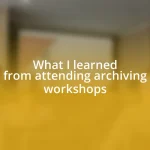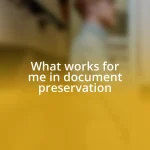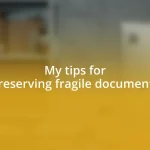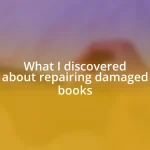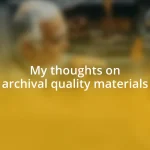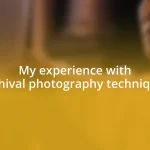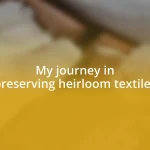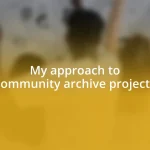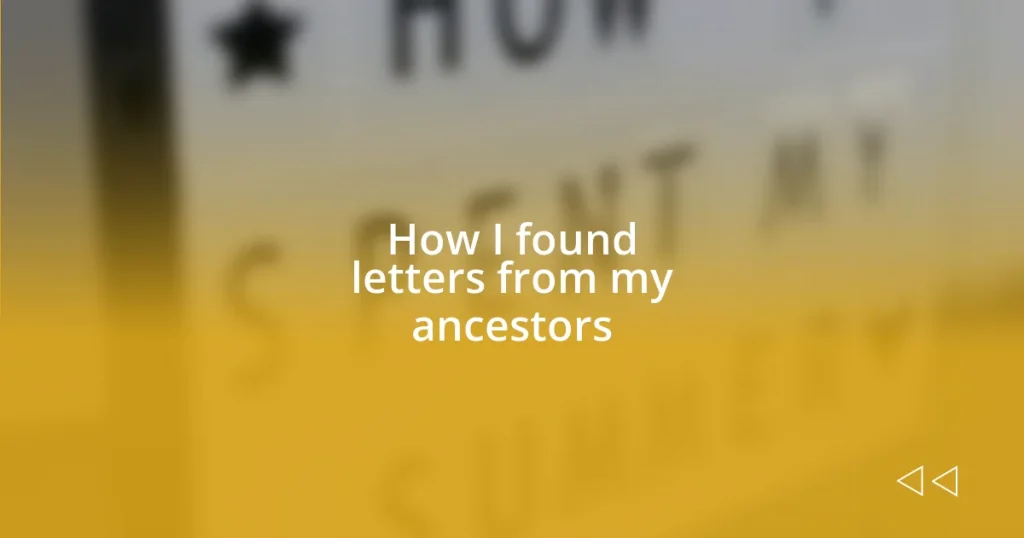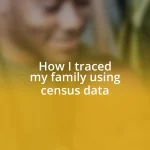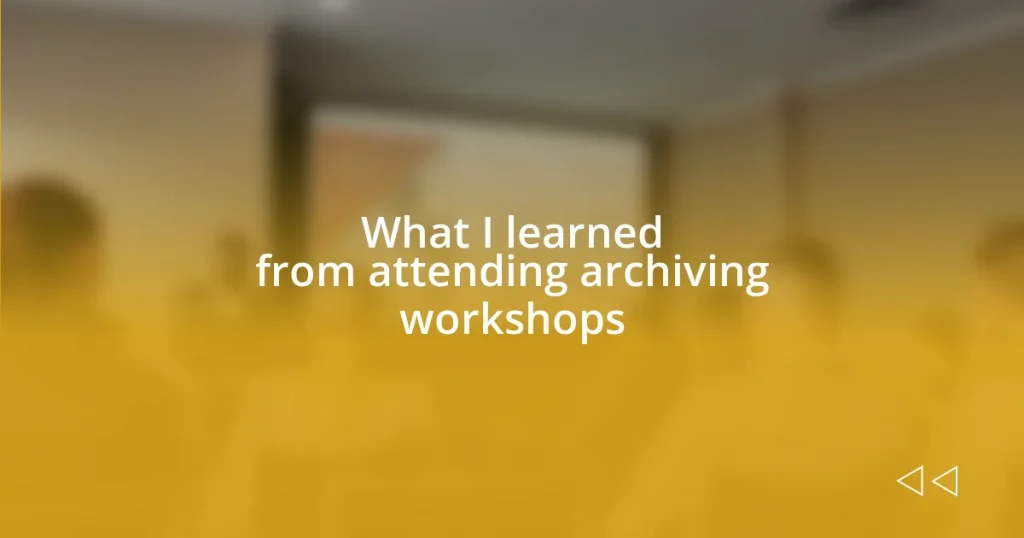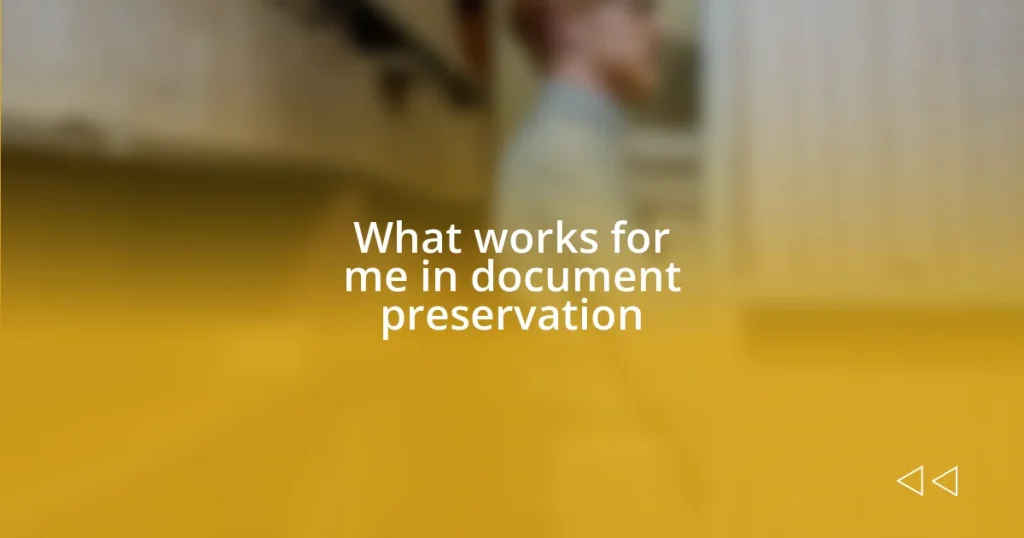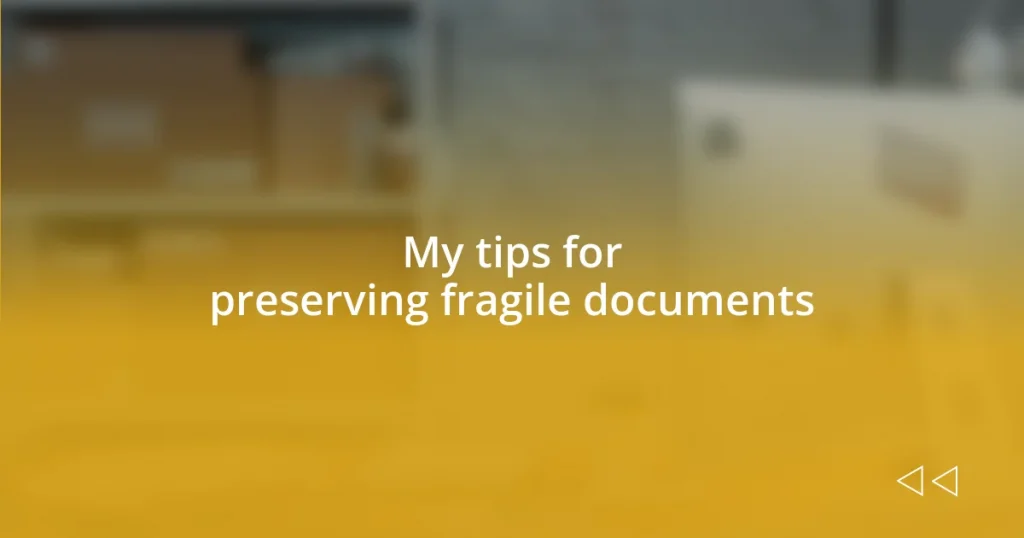Key takeaways:
- Discovering ancestral letters deepens personal identity and connects past experiences with present emotions.
- Exploring historical document archives allows for meaningful connections to family history, revealing untold stories and enhancing lineage understanding.
- Sharing discoveries among family fosters connections and inspires collective exploration of personal histories, enriching familial relationships.
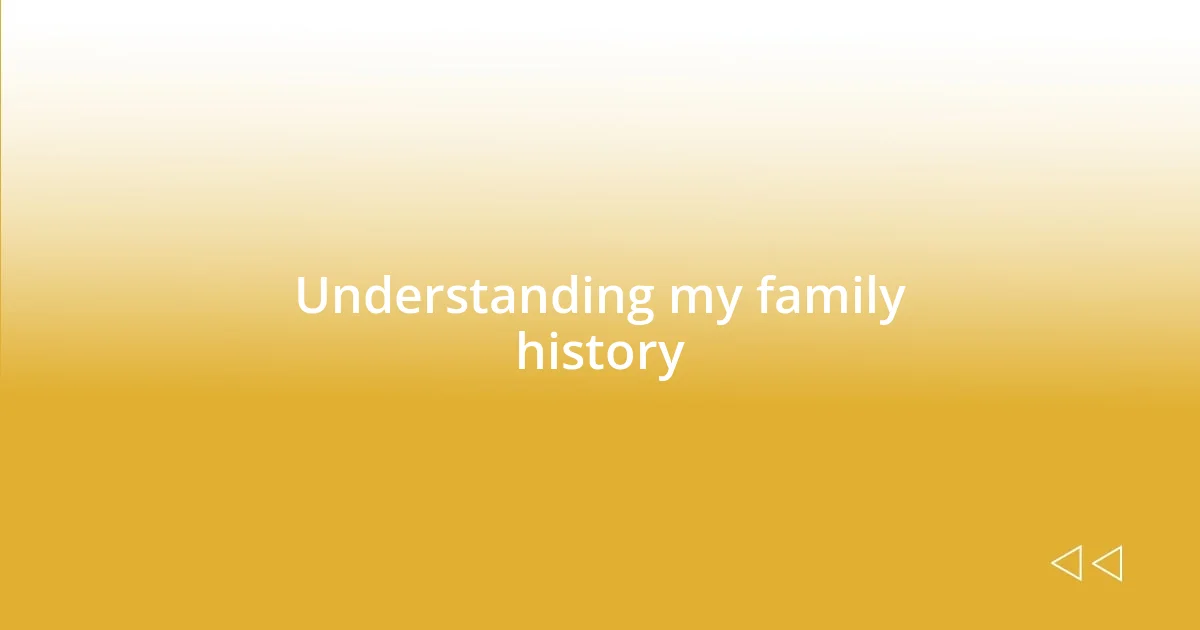
Understanding my family history
Understanding my family history has always felt like peeling back layers of a complex onion. Each name I’ve discovered in my family tree brings with it a story, a context, and a connection that resonates deeply within me. I often wonder, how could strangers from the past influence my identity today?
I remember the moment I stumbled upon a letter addressed to my great-grandmother from her brother, who had emigrated to America in the early 1900s. Reading his words brought tears to my eyes. It was like hearing his voice through time, expressing his dreams and struggles in a way that made me feel closer to him than I ever thought possible. Isn’t it fascinating how a few well-chosen words can bridge generations?
Diving into my family history has transformed how I view my place in the world. Each letter, photograph, and documented event reveals not only where I come from but also the values, challenges, and triumphs that have shaped my lineage. I find myself asking, how can we fully appreciate our present if we don’t explore our past? The answers lie in the stories waiting to be uncovered.
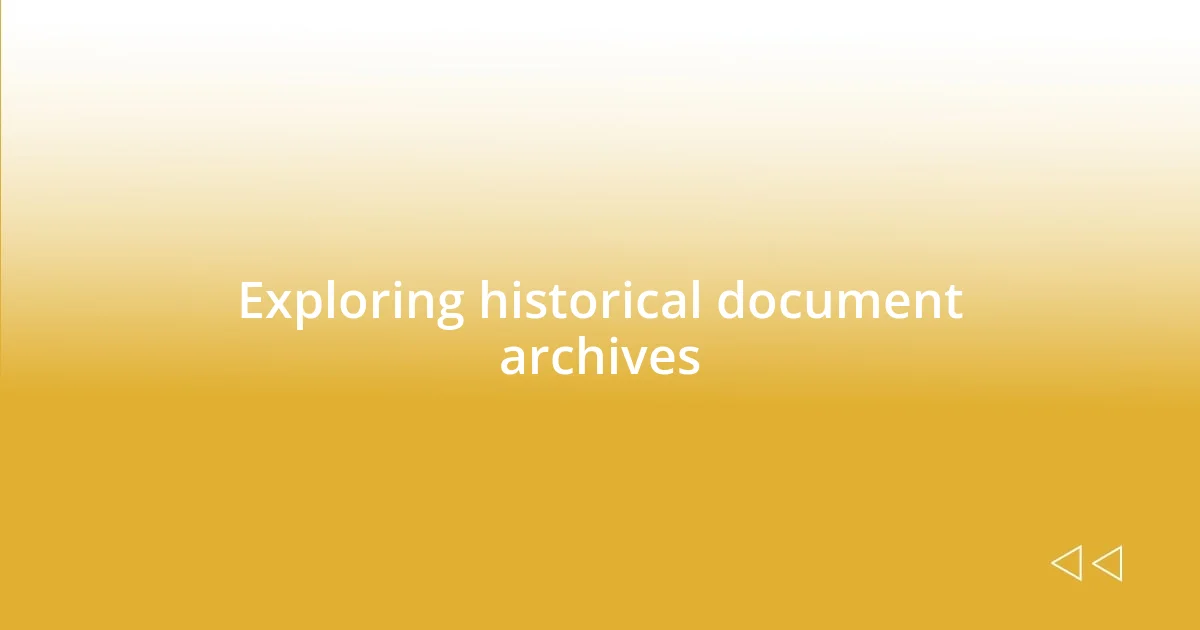
Exploring historical document archives
Exploring historical document archives can feel like embarking on a thrilling treasure hunt. Each archive holds a wealth of untold stories, waiting just for someone with curiosity to unlock them. I recall my first visit to an old local library, where dusty shelves lined with fragile papers seemed to pulse with history. As I sifted through stacks of yellowed documents, I felt an electrifying connection to the past, as if I were part of the unfolding narratives.
- Local libraries and state archives often house family histories and census records.
- Many organizations and genealogical societies provide online access to digitized archives, broadening your search.
- It’s often in the most unexpected places, like community centers or old church basements, that personal letters and journals can be found.
- Don’t overlook estate sales or antique shops; sometimes, families part with keepsakes that hold immense historical value.
With each document I uncovered, I experienced a mix of excitement and reverence. I remember finding a faded photograph tucked away in a family estate file, revealing a long-lost relative I never knew existed. It struck me how much we can learn—not just about ancestors’ lives, but also about ourselves—when we engage with history in such a tangible way. There’s a profound beauty in piecing together fragments of the past; it’s a reminder that our stories are woven into a larger tapestry of life, rich with emotion and connection.
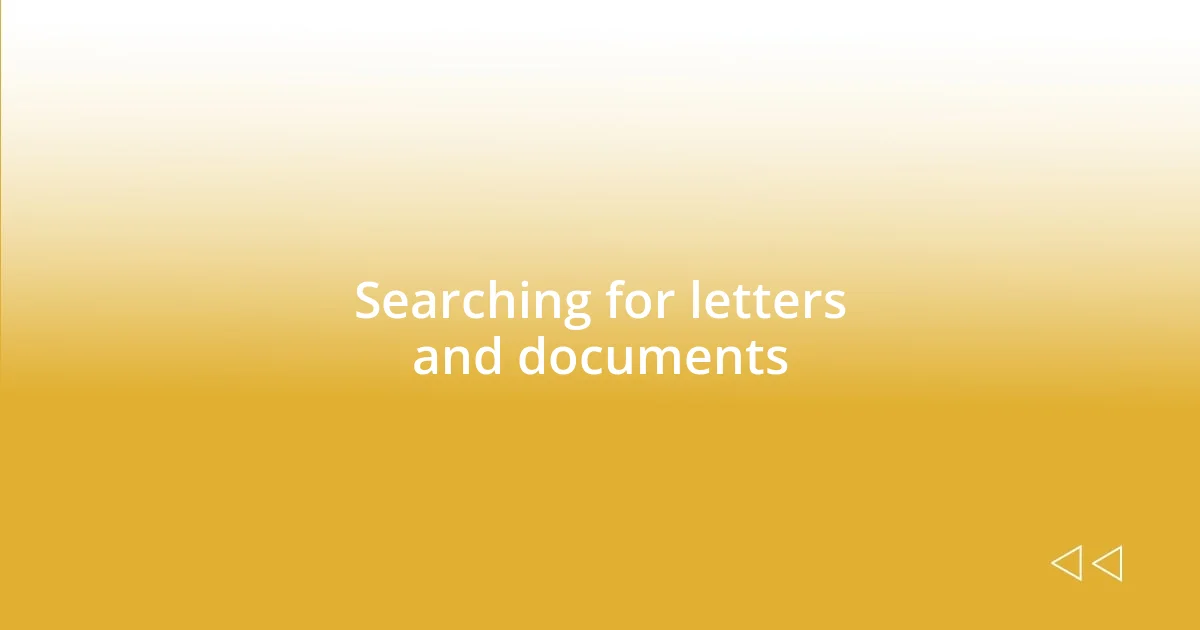
Searching for letters and documents
Searching for letters and documents can sometimes feel like walking through a magical doorway into another time. I recall one winter afternoon when I was rummaging through my grandmother’s attic. Sunlight filtered through dusty windows as I unearthed an old wooden box filled with letters tied together with a frayed ribbon. Each piece of correspondence was a glimpse into the hearts and minds of my ancestors, and it was an exhilarating experience to connect with their emotions and experiences in such a direct way.
As I dove deeper into my search, I learned that patience is key. I often found that the most valuable letters weren’t always in the most obvious places. For instance, at a family reunion, a distant cousin revealed that their home held a trove of letters from my great-great-grandfather. I had no idea these treasures existed so close to me! What struck me was the sheer joy and surprise in sharing this discovery with family; it made our connections stronger and now we have a shared mission to preserve and understand our history together.
Navigating through various archives, I often encountered setbacks, but each challenge brought its own rewards. Whether it was identifying a peculiar writing style in a long-lost diary or decoding faded ink on a letter, these experiences became lessons in persistence. I remember finding a document that seemed insignificant at first glance—a grocery list from the 1940s. But as I dug deeper, it revealed the daily life and priorities of my ancestors, painting a picture of resilience during hard times. These little discoveries often captivated my imagination, reminding me that every fragment of history is a thread that weaves together the rich narrative of our lives.
| Location | Potential Discoveries |
|---|---|
| Local Libraries | Census records, family histories |
| State Archives | Government documents, marriage licenses |
| Genealogical Societies | Digitized letters, online databases |
| Estate Sales | Personal letters, journals, photographs |
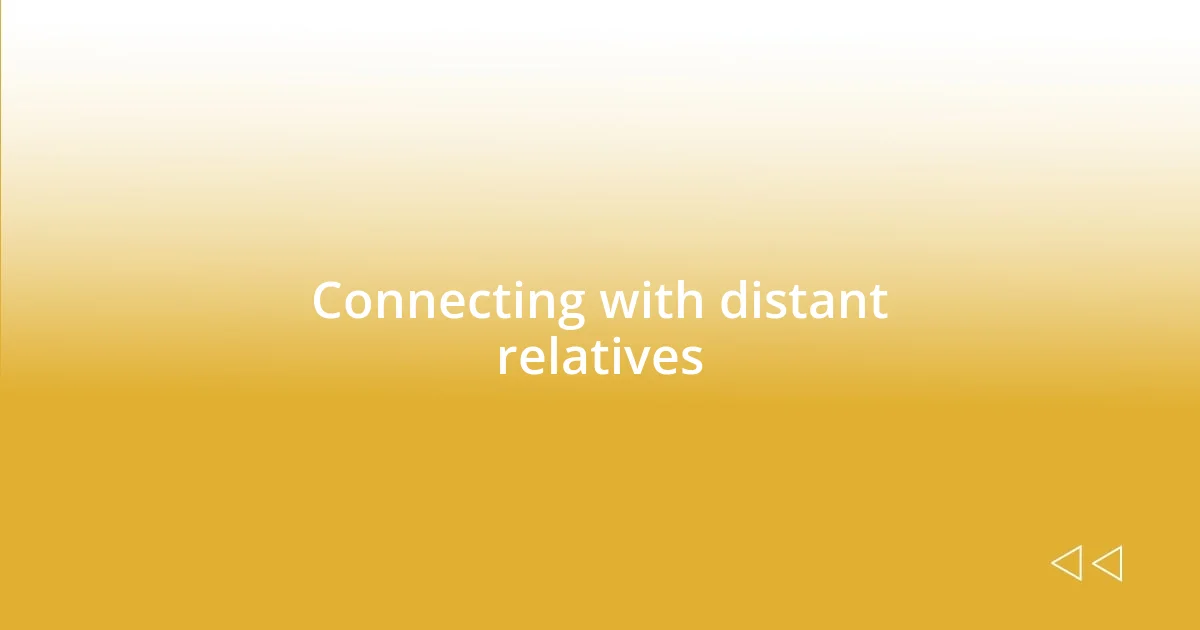
Connecting with distant relatives
Connecting with distant relatives can feel like rediscovering pieces of your own identity. During one particular family gathering, I ended up in a lively conversation with an older cousin I never knew existed. To my surprise, she shared stories about our shared ancestors, including captivating details that added layers to my family history. It was like unearthing a hidden treasure chest of memories, and I couldn’t help but wonder how much more we could learn by reaching out to those distant branches of our family tree.
Sometimes, these connections bring unexpected emotional insights. I once emailed a distant relative after stumbling upon his name in an old letter collection. Our exchange opened the floodgates to stories from our family’s past, which included tales of hardship and triumph. I felt a deep sense of empathy as he recounted his great-grandmother’s struggles as an immigrant. It struck me how much our family ties transcend time, binding us together in ways that can only be understood through shared experiences and narratives.
Through my own discoveries, I realized that each letter and story shared is a bridge that strengthens familial bonds. Have you ever felt that palpable excitement when you click ‘send’ on a message to a relative hoping to share some newly discovered history? I remember the wave of anticipation that washed over me as I awaited a reply. Each response felt like an affirmation that no matter how far apart we may be, the strands of our family narrative unite us, enriching our understanding of who we are and where we come from.
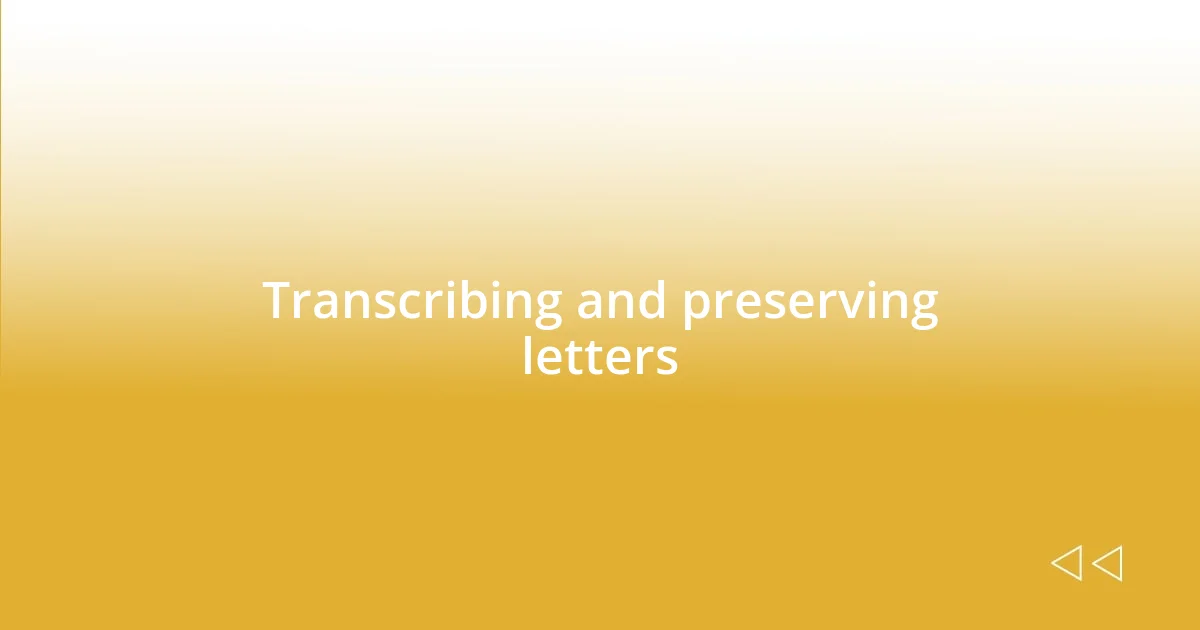
Transcribing and preserving letters
Transcribing letters is an intimate process—each faded word feels like a conversation with the past. I remember sitting at my dining room table, surrounded by stacks of old letters. The musty smell of aged paper filled the air as I carefully transcribed each letter, letting the stories unfold like a long-lost storybook. It made me wonder: how often do we stop to appreciate the beauty of someone’s handwritten thoughts?
Preserving these letters goes far beyond mere transcription; it’s about safeguarding memories. After transcribing, I took great care to store the letters in acid-free folders. Each letter was a fragment of history, and protecting them felt like my duty. Have you ever felt a surge of responsibility for preserving someone else’s story? I could hardly breathe as I sealed them away, knowing that future generations might one day hold the same letters and feel the same connections I did.
The journey of transcription also reveals surprising emotional depths. While typing out a letter from my great-aunt, I stumbled upon a heartfelt expression of love for her children amid her struggles during the Great Depression. I couldn’t help but reflect on my own life and the challenges I face today. It made me realize that these timeless emotions—love, hardship, and resilience—transcend generations. Have you ever found solace in a letter that echoed your own experiences? That moment of connection made it clear to me that these letters are not just relics; they are lifelines to our past, full of lessons waiting to be uncovered.
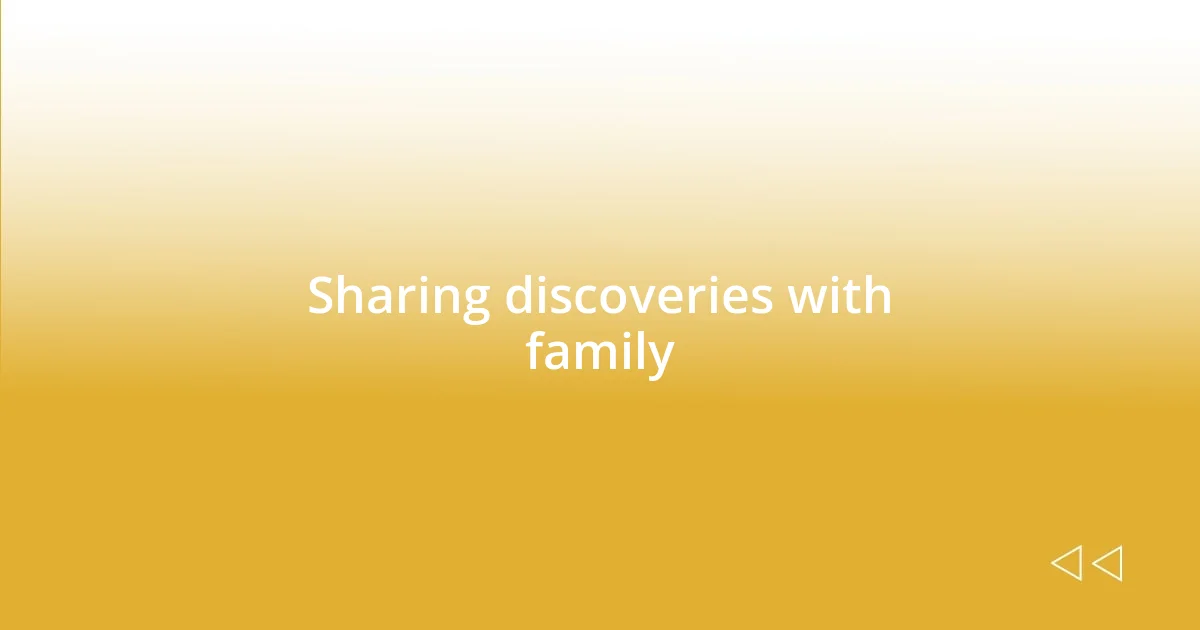
Sharing discoveries with family
Sharing my discoveries with family has been one of the most rewarding aspects of this journey. I vividly remember gathering around the kitchen table with my parents, excitedly revealing the letters I’d unearthed. As I shared snippets, my mother’s eyes welled up with nostalgia, sparking her own memories of stories passed down through the generations. Have you ever felt that surge of joy when you see family members connect over shared history? It’s amazing how those little discoveries can ignite conversations that bring us closer together.
The reactions I received were incredibly varied. Some family members were eager to contribute their pieces of the puzzle, while others were inspired to dig through their own keepsakes. One afternoon, my aunt pulled out an old photo album, and together we matched faces to names from the letters. I felt a rush of excitement—each connection made my family tree come alive. Have you ever experienced that moment when you realize how rich and complex your family’s narrative really is? It’s a beautiful reminder that we are part of something much bigger than ourselves.
In sharing these letters, I’ve also had the chance to encourage family members to explore their own stories. During a recent family video call, I challenged my cousins to seek out their own hidden treasures. I asked them, “What stories do your parents tell that you’ve never recorded, and how might they complement the letters I found?” It was thrilling to see the spark in their eyes, as they realized they, too, hold pieces of our family’s legacy. It’s a connective thread that weaves us closer together, ensuring that the past continues to resonate in our present.
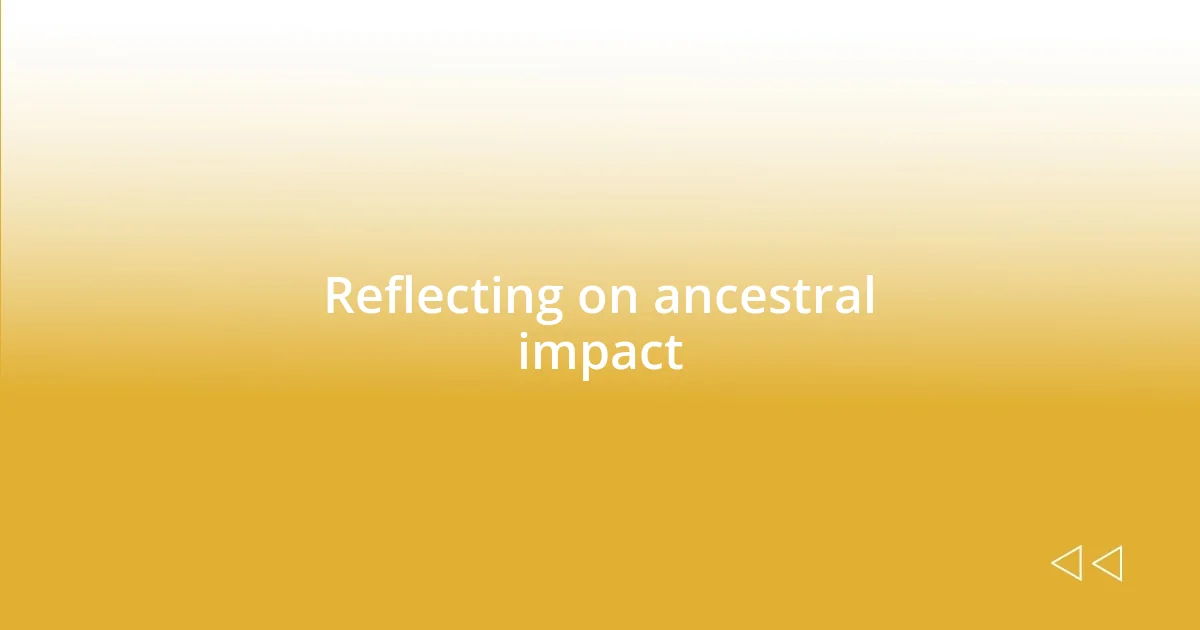
Reflecting on ancestral impact
Reflecting on the impact of my ancestors has transformed my understanding of who I am today. I still remember the first moment I realized that the fears and joys they expressed in their letters mirrored my own. Reading about their struggles during tough times, I couldn’t help but connect those feelings to my present-day challenges. It’s as if their experiences were whispering to me, urging me not to feel alone in my journey. Have you ever felt that deep connection across time?
As I immersed myself in these letters, I found myself pondering the lessons they offered. One letter from my great-grandfather filled with uncertainty about the future resonated with me more than I expected, reflecting my own anxieties about career choices and life transitions. This realization struck me: while times change, the fundamental human experience remains the same. Don’t you find it fascinating how emotions can bridge generations and bind us to our ancestors?
This journey has also prompted me to think about how I want to impact those who come after me. Each letter is a reminder that our thoughts and feelings are worth recording. I’ve started journaling more frequently, hoping to leave behind my own collection of memories—perhaps something my descendants will cherish someday. What stories will you share with the next generation? I believe it’s our responsibility to continue this legacy of connection, ensuring that our voices join those of our ancestors in the tapestry of our family history.
